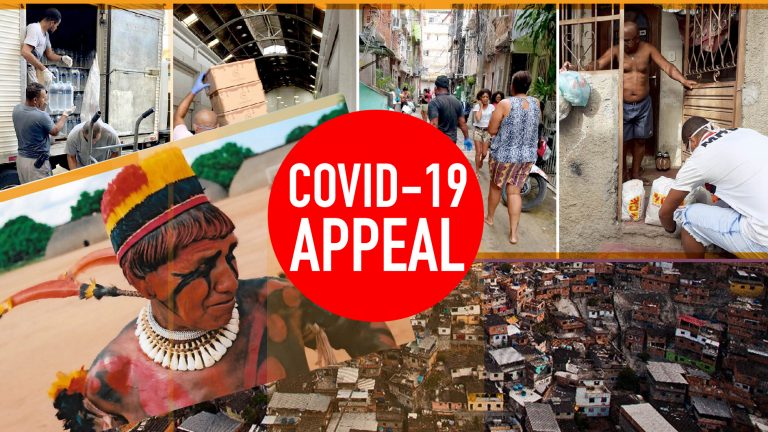In the face of the crisis, People’s Palace Projects is working closely with some of its Brazilian partners. These community-led organisations have been taking matters into their own hands in an effort to prevent the spread of the virus to the most vulnerable in their communities. Favela residents and indigenous people are among those most at risk. As of 11 May 2020, 163,000 cases have been confirmed in the country, causing more than 11,000 deaths. The pandemic has triggered divergent responses from federal, state and local governments, with an immense impact on politics, education and the economy.
Our partners are now in desperate need and would appreciate your support:
- Indigenous Association of the Kuikuro People in Xingu (AIKAX)
The Kuikuro are a community of around 800 people living with other 15 indigenous peoples in the Xingu Indigenous Territory, a protected area of more than 2.6 million hectares. The Xingu Indigenous leaders are calling their communities to adhere to the lockdown in the village and forbid the comings and goings of Indigenous people to and from the cities, fearing the coronavirus could be devastating to the villages that have limited access to medical care. AIKAX has set up a way in which essential supplies are bought from trusted suppliers in the closest city Canarana, 200km away, brought down river by boat, and collected by one designated member of the village to minimize any risk of exposure. AIKAX is starting to run out of money to pay for the freight and the supplies, primarily hygiene items, petrol for fishing boats, and diesel for their generator.
You can support AIKAX clicking here
- Agency for Youth Networks – Agência
The reality and struggles of the pandemic are most felt in the favelas. In these communities armed conflict is rife, overcrowded living conditions make social distancing measures almost impossible, low-income families depend on informal jobs to survive, and residents have extremely limited access to healthcare resources and water and sanitation infrastructures. Agência de Redes para a Juventude, was founded in 2011 to work with young people living in the favelas of Rio to transform ideas into creative projects. The NGO is now supporting 1,000 families from the most vulnerable zones of the city with subsistence and hygiene items. They are also actively producing informative news and videos content shared online encouraging people to stay inside, counter-acting Brazil’s government’s dismissive attitude towards the most vulnerable and marginalised.
You can support Agência clicking here
- With One Voice
Since 2016, People’s Palace Projects maintains the With One Voice Choirs in Rio de Janeiro, formed by around 100 members with experience of homelessness. They engage in workshops, rehearsals and performances around the city and received a weekly meal, but due to the global pandemic, all activities and meetings promoted by the project had to be suspended indefinitely. While part of our choirs is now in shelters provided by the Rio de Janeiro’s City Council, a group of about 20 choir members still live in the streets. To guarantee that the support to these members are still somehow in place, PPP is partnering with the social project Quarantine without hunger, which is working in the frontline distributing daily meals to people with experience of homelessness, and supporting raising awareness and key information about ways to prevent COVID-19 contamination for those who have the streets as homes.
You can support With One Voice clicking here
- Redes da Maré (Maré Favelas)
In the absence of government help, Redes da Maré (Maré’s Network), an NGO created by residents of Maré in 2007, has launched a public health and emergency campaign to assist 140 thousand people from16 favelas in Rio de Janeiro. Redes has been in the frontline of actions to support hundreds of families facing famine during the pandemia of COVID-19. A long-time partner and collaborator of People’s Palace Projects researches, the NGO launched their campaign “Say NO do Coronavirus” The programme gives support to the community, including the creation of a food bank for vulnerable families, delivering door to door of food and hygiene supplies, catering and distributing meals for people living in the streets. Up until mid-April, the organisation had delivery over 2.500 food kits and 2.500 hygiene kits, and more than 1.400 meals to vulnerable people. They are calling companies and individual donors to support and help them continue this campaign until the end of the pandemia.
You can support Redes da Maré clicking here
